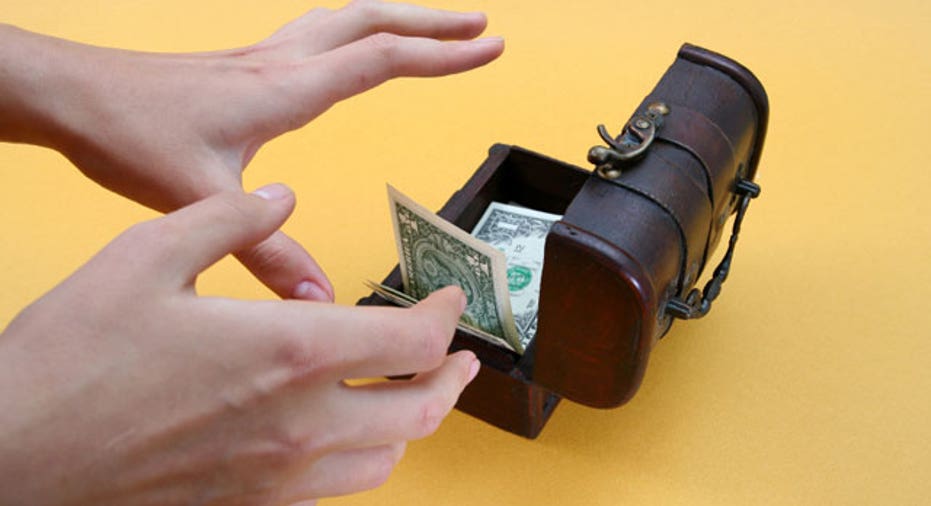Paying Down Debt vs. Saving: How to Decide

Dear New Frugal You,
I have a 30-year loan on my townhouse with 6% interest. I paid $72,500 and three years later I owe about $70,000. My only other debt is a six-year new car loan with 11.6% interest. I paid $24,000 and have not made my first payment yet.
If I have extra money each month to pay toward one of these debts, say, $400, which one should it go to? Things to factor in: Property values seem to have dropped the value of my house by about $10,000. I don't know how long I'll live there. I wanted to calculate an answer, but wasn't even sure which numbers to include. I want to get these debts paid off so I can start seriously saving for retirement.
- Kylie
Dear Kylie,
Congrats on your new car. Hope you enjoy it! Your plan for paying off debts and then saving for retirement is a good one. Let's see if we can't find a way to maximize the value of that $400 per month.
Let's begin with the obvious. There sure are a lot of numbers involved. You could spend days designing a spreadsheet to try to figure all the combinations. So the first step, and perhaps the most critical one, is to decide which variables are important to getting the right answer.
To find the right ones, we need to refine the question a bit. What I think you're asking is, "Where can I put that $400 each month that will provide the most value to me in the future?" Or, to put it another way, "Where will this money add the most to my future net worth?"
With that in mind, we can eliminate some variables. We'll begin with the townhouse. Who knows whether the value will go up or down in the next few years. It really doesn't matter. Prepaying your mortgage won't increase or decrease the value of the townhouse. And the value of the townhouse won't affect the amount still due on the mortgage. So we can focus our attention on how prepayments will affect the balance on the mortgage and forget about the value of the townhouse.The same thing holds true for the car loan. The car will depreciate whether or not you prepay the loan. Your only concern is how prepayments affect the balance of the loan.
There is one exception. Before you prepay a car loan, you need to make sure that prepayments go to reducing principal. Some nasty loans don't allow for principal reductions. Prepayments just go to your next scheduled payment and there's almost no benefit to prepaying. Dig out your contract and check it for the section on prepayment.
Now let's compare the two loans. That will be fairly simple. All we need to do is to look at the interest rates. You get out of debt faster by paying down the loan with the highest rate first. So if you're going to pay off a loan, put the auto loan first in line.
But let's take this one step further. Could you be better off paying debts on schedule and use the $400 to begin saving for retirement now? To answer that question, we need to estimate the return on a retirement investment.
You don't say where you would invest your retirement savings. We'll assume that you'd use an individual retirement account or 401(k) plan to avoid taxes. You also don't say what you would invest in. We'll assume that you choose a balanced mutual fund that has been earning in the 7% range.
Before we can compare that 7% return to the cost of borrowing, we need to consider two factors that could affect how much your investment/savings earns. The first consideration is taxes. If you were investing/saving outside a retirement plan, you'd need to subtract any taxes from your return. But, in this case that's not applicable.
The second consideration applies to many 401(k) accounts. That's any employer matching funds. For instance, if your employer matches 50% of your entire contribution, that's just the same as if your $1 earns 50 cents the first year and then 7% for every year after. In the short term, that's a 57% return!
So, if you have an employer match, you'll be wise to use that $400 for retirement savings, even if that means delaying paying off debts. Do this at least to the point that the match runs out. If your employer caps its match, after you've reached the cap, you'd compare the savings 7% to the car loan's 11.6% -- and use money to pay off the car loan first.
It's possible that other considerations would take priority over the return, but that doesn't happen that often. One example would be if you were trying to pull up your credit score. In that case, paying off debts could be more important than savings.
You're in a great situation, Kylie. Your frugal lifestyle has allowed you to begin paying down debts and accumulating wealth.
See related: Repaying early on a loan, Transfer car loan to a low-rate credit card? Yes, but carefully



















